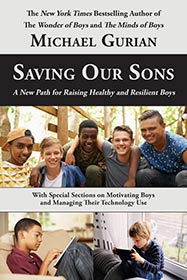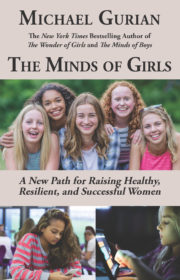From Michael Gurian: I want to delve into election politics for a moment in a way perhaps different than others in the media. I will not try to get you to pick a side. I am a social philosopher not a politician.
My direction today will go toward evolutionary biology and brain chemistry though I have some preamble of personal predilections I want to share with you. I think they are confessions important to the ultimate topic.
Social Media Use of One Moderate Voter
As a professional and a writer, I tend to read everything I can about a topic or policy, but since the death of my wife, Gail, I have avoided most social media. For me, life is hard enough in Gail’s absence; I don’t want to take on hyperbole, fear, and rage from media because of the proven brain link between that media and depression/anxiety. When I read articles from both Left- and Right- leaning papers and sites (and when I try to watch both sides on TV), if the first few paragraphs (or images) are algorithmic rather than journalistic or science-based I move to the next source.
My self-protection is not just about avoiding the painful alternate realities social media creates in us to make their profits; it follows also from the fact that I am a political moderate (a centrist). This is what Gail and I became together as a couple and who I have been as a social philosopher and voter over the last 35 years. “Independent” is the word for me party-wise, I think, but there are very few independent candidates in Washington State, so I have voted around 65% Democrat and 35% Republican over the years. I was raised a classical Liberal. If you read The Free Press on Substack or watch Bill Maher on HBO, you see the kind of Liberal (which now means Moderate) that I am. Maher and I were born one year apart, we were raised liberal, and though we don’t agree on everything, I think we are now moderates who retain political sanity by trying to keep a sense of humor.
Did Kamala Lose Because America Is Sexist and Racist?
I lay out my background politically in part to preamble the fact that I think a moderate view of what happened in the election, specifically regarding sex and gender, is crucial if America is going to elect a female president in the future. You’ve no doubt read media/social media saying that Trump was elected because America is too sexist and racist to vote for a woman or a black person as President. There is indeed sexism and racism in America, but as a researcher and as a political moderate, I believe blaming the Harris loss on the two isms may not help a woman become President in the future. Why?
Many writers about sex, gender, and the election say that Trump won because he got the “bro” or “manosphere” vote. They claim this vote is proof that he and all or most of his voters are misogynists. Trump did get many of these votes, but he also got tens of millions of women’s votes; these women are not misogynist. In fact, the majority of married women voted for Trump. That says something. And Trump got tens of millions of voters of color, including many black women. That also says something.
Thus, I think there is a distracting reduction in the accusation of racism and sexism as the main reason for Kamala’s loss—despite that, again, some Americans are definitely racist and sexist and Harris was not able to get votes from these people. But their votes are not the moderate votes I’m writing about in this article. I want to see the next female candidate get enough moderate votes to win especially because the majority of Americans poll as moderate.
Why My Vote Went to a Woman
As a classical liberal, now political moderate, and a sex and gender expert, I voted for Hillary Clinton in 2016 and Kamala Harris in 2024. I believe both of them were/are well qualified for President, and I believe that America needs to join the rest of the world in electing a woman to the highest office. Margaret Thatcher, Indira Ghandi, Golda Meir…the list of women who have ably led developed and developing countries is long. Women bring their own leadership style to high office and I think we need women’s leadership in the presidency. Back in 2008 I published a book that looks at the differences between male and female brains/leadership styles, Leadership and the Sexes. This is a science-based approach to this topic if you are interested. Also, I explore this topic further in Boys, A Rescue Plan, written with Sean Kullman, which is coming out next February.
Clearly, sexgender affected my vote, though perhaps in a different way than we read in social media that sex and gender affected other men’s votes. I am a man who voted for these two women to support my country in being rewarded with female assets. I felt that their sex, their brains, would better unite our country than Donald Trump’s. Kamala Harris is more Left than I am in identity politics, so it was difficult for me, as a moderate, to vote for her. Donald Trump is more extreme Right, so it was difficult for me to vote for him on certain policies. As a moderate I ended up voting for Kamala because I decided to focus on uplifting women’s leadership.
The Hidden Way Sex/Gender Lost These Two Women Their Elections
In the Clinton and then Harris campaigns, I saw the two women lose the election because they were not strong enough for enough moderates, especially in swing states, to vote for them. For anyone to compete at the top of human hierarchies they must be strong and show strength. This is “a brain thing,” primal at the level of evolutionary biology, thus, relevant even if ephemeral at the level of politics and media. Especially in a campaign for president, what people see a man or woman do strongly is more important to their vote than what this man or woman says.
A person can speak word salad at times, as both Trump and Harris did, with Trump emphasizing lying and grievance and Harris deflecting or not answering questions; those sins of speech are not the worst sin in a voter’s brains because every human being has said things we regret or things that didn’t make sense and everyone has told little lies. The leader that most people choose to vote for is the person who, beyond the word salad, beyond the lies, beyond the grievances, shows strength. Why? Many reasons, starting with brain chemistry.
Both women and men who rise high in hierarchies (as every presidential candidate must do) tend to have higher than average testosterone. Obama, Biden, Trump likely have higher testosterone than most men (just like star athletes do) and Hillary Clinton and Harris likely have higher androgenic hormone (testosterone) compared to most women. While testosterone is a sex drive chemical, throughout the lifespan it is our aggression chemical, our assertiveness chemical, our “doing” chemical. Men on average have 10 to 20 times more testosterone in their bloodstream and brains than women on average. They are already wired to climb hierarchies by trying to prove themselves as strong. The challenge for male candidates is to show strength while also being empathic.
Women have more oxytocin in their bloodstreams and brains than men on average. Oxytocin is the human “tend and befriend” chemical, the direct empathy chemical. Without women having more of this chemical the human species probably would not have survived or thrived. We need people around us who will almost immediately stop what they are doing to empathically take care of children, other family members, friends, neighbors, colleagues, others, the public. Over the lifespan, the person whom this oxytocin can seem to “betray” is the woman herself—which is why we hear women say to spouses or friends, “I’m so busy taking care of everyone else, I’ve lost myself.”
Testosterone focuses on personal power and assertive strength. Oxytocin focuses on empathizing directly with other people’s pain and need. An example of the sex difference perhaps everyone can relate to appears in consistent research findings in corporate and business sectors: meetings run by men, on average, end more quickly than meetings run by women, on average. Women leaders do not as strongly assert their positions—they ask for everyone’s input and listen and empathize (on average) which creates longer meetings. This can be a very good thing and corporations that have women at the top often succeed in myriad ways.
Applying Brain Chemistry to the Election
All this neuro-biology was a huge factor, I believe, in the elections. Men have an innate advantage via biochemistry in climbing hierarchies; high testosterone men live in a hyper-drive to prove their strength because they are wired by their dominant hormone for that. Donald Trump is one of those men.
But women win elections throughout our country and the world (Thatcher, Ghandi, Meir, Nancy Pelosi, Patty Murray, et. al.) when they match their male (or female) opponent in shows of strength. They do this each in their own way by integrating empathy and aggression into their actions/words with show-of-strength as paramount in their own mind’s eye. “I need to be strong,” they say to themselves. “To be strong, for me, means…….” They fill in the blank and go forward focused on that strength. Where male candidates must biochemically work on infusing empathy into their strength, female candidates tend to work on infusing strength into their empathy.
I believe neither Hillary Clinton nor Kamala Harris ran a campaign that could win the presidency because while both of them empathized with certain large groups, e.g. with women on abortion rights, and while Kamala tried to be kind, empathic, and positive in her messaging, neither of these candidates showed enough personal strength in their interactions with the public. This is the “sexgender element” I hope they will explore as central to their losses more than overemphasizing “America is racist” (especially given that Barack Obama was black and he was President twice) or “America is inherently misogynist,” given that women, including women of color, are getting elected to high office everywhere in the United States. The strength factor is, I think, a key factor they must contend with.
Notes Before Continuing
A brief interlude to caveat two things.
If you are on the Right and voted for Trump because you like him on policy and/or you voted for him as “not Harris” or “not Left,” you might stop reading this and say, “Gurian, how could you support Harris? She and Biden have ruined America.” I am not trying to convince you of who to vote for or say that your vote was the wrong vote. Rather, I think today’s analysis will help Republicans elect a woman President in the future, and I do think Republicans will one day have a female candidate. I hope that candidate and her supporters benefit from honing in on the strength factor. So, please don’t stop reading!
If you are on the Left and voted for Kamala because you liked her on policy and/or you voted for her as “not Trump,” you might stop reading this and say, “Gurian, this is just mansplaining,” or “this stuff didn’t matter to me, I voted for her,” or “convince the sexists and racists, not me,” or “biological stuff is just another example of the glass ceiling and how biased American life is against women.”
I don’t want you to stop reading, so let me respond with, “There are definitely ways in which life is unfair to women (and life is unfair to men), but I don’t think we should link biology with bias, mansplaining, sexism, or racism per se.” While men cannot give birth to babies but women can, this is not unfair to men or to women—it is just reality, in the same way nature has given some people a darker pigment and others a lighter pigment. Nature has no moral compass. Biology is not bigotry. When we coach one another to work with our human biology, we succeed in hierarchies, families, and the world. This is why I believe the strength/empathy paradox is so crucial to human voting—not because it is fair or unfair but because it is so real.
And so I hope everyone will read on!
Priority Number One: Be Strong and Project Strength
Women (and men) who win elections and run companies do so because they empathize/bond (the “soft skills” or “social emotional intelligence” written about everywhere these days) but also because they speak strongly and do things strongly. Their ability to empathize is integrated into their strength rather than their strength diminished by their empathy. Women can lose elections for policy reasons, of course (including, for Kamala, high inflation), but from the sexgender standpoint, they lose if they go too far into empathy without integrating/sublimating empathy into strength.
If you look back at tape from Margaret Thatcher’s campaigns, you see both empathy and strength projected. If you look at video of Hillary Clinton’s and Kamala Harris’s campaigns, you see empathy but much less strength.
Hillary avoided doing media in swing states in her last months of campaigning, and then Harris did the same, which is not a strong position.
When each of them were asked by media and in the debates what they would do for Americans, they pointed to their websites (“go to my website, my policies are there.”) Both of them have significant experience with policy that we absolutely need in a president, but “go to my website” is not a strong position.
More subtle, while both Clinton and Harris showed feminist strength to women voters, that ideological vision is victim-based (women as victims of male dominated society, and people of color as victims of white people), thus it is only a strong position for a minority of voters. It alienated millions of women voters and abandoned millions of male voters, which puristic victim psychology often does: while absolute victim thinking can seem strong to some voters ideologically, it loses huge swaths of moderate, independent, Hispanic, White, Asian, and Black voters who don’t see the world that way.
And, very telling, when Harris was asked to appear on shows like Joe Rogan’s, where she would be challenged to be strong and show strength, she avoided those shows. She mainly went on shows that “soft balled” questions.
All of this adds up to not showing enough strength, which means not showing enough of the essential human quality of resilience that voters look for as they mine media, social media and political events looking for evidence of strength in a candidate.
But Wasn’t Kamala Stronger on Policy?
The will to elect a strong leader shows up in policies, too. As you have seen in countless polls, articles, blogs in the last month, the majority of Americans voted for Trump and for Republicans because they saw these leaders as stronger than Democrats/Harris on many or most policy issues.
Trump polled as stronger on facing inflation and on the economy.
Trump polled as stronger on dealing with illegal immigration.
Trump polled as stronger on crime.
Trump polled as stronger on issues raised by extreme gender politics.
Trump polled as stronger on dealing with government overreach.
Trump polled as stronger on helping solve wars, including in the Middle East and Europe.
Trump polled as stronger on the resilience factor—his “Make America Great Again” campaign is built almost completely on, “With me at the helm, we will have a country that stands up resiliently to everyone aggressing against us.”
Harris polled as stronger on protecting women’s abortion rights.
Harris polled as stronger on green energy and environment.
Harris polled stronger on personal character.
Harris did not poll stronger than Trump on enough policy questions to make up for her lack of strength in leadership style.
On the final item regarding character, an even wider gender gap appears, something also ephemeral, but relevant. Harris’s campaign targeted Trump for being a criminal, a fascist, a person with suspect character, a malignant narcissist, a threat to democracy, self-serving (not caring about the American people, only himself) and Trump was/is a convicted criminal; even many of his Christian fundamentalist supporters see him as having character and personality defects; many psychologists have noted his narcissism; he has denounced some democratic elections; and he makes no bones about being a self-serving billionaire businessman—all this is real ground for opponents to stand on.
But while it can be a show of strength to attack an opponent’s character in rising up hierarchies, the problem for Harris was that America had four years of Trump in office and a lot of things went well for the majority of voters in the first three years of that time (before Covid), including certain things, like the tax cuts, going well for the working class and minorities. Donald Trump was and is a chaos agent, and he is also lot of the things listed above, but just attacking his character couldn’t work in 2024 to reveal Kamala’s strength because Trump had already successfully and strongly prevailed. Attacks on him ended up sounding as if they were not rooted in the majority of voters’ reality.
In the majority’s reality, Harris/Biden appeared to be weak and Kamala didn’t respond to this primal impression well enough. To be fair to her, though, she only had three months to run her whole campaign, and three months may not have been long enough to create her own position of equal or surpassing strength. But overall, in those three months, I think Kamala’s overuse of attacks on Trump weakened her campaign with independent and moderate voters in the swing states. My proof is that she lost millions of women and women of color. They and their husbands and sons and brothers and fathers and mothers and sisters and daughters tuned out the vitriol on both sides and voted for the person they thought would most strongly protect themselves, their families, and their communities.
The Revelation of Protection
Strong translates to protective in the human brain because evolutionary biology is set up that way. We vote for the leader whom we believe will protect us and our family—even when that person is as flawed as Trump is. While “it’s about the economy, stupid,” pundits always say, and of course they are right (the economy is almost always the biggest issue on people’s minds and Harris lost on the economy), a huge mistake will be made by Democrats and by women candidates in the future if they stick with just labeling Americans as sexists and racists and miss the link between “strength” and the biology of protection.
We exist as human beings in a hierarchy of four pro-social intentions (needs):
protecting
providing
nurturing
destroying.
(It is primal to want to destroy things and systems we don’t like, so I include it here). Protection is often our highest priority in adulthood—especially if we have sired children—because we are constantly focused on family safety. The word and idea of “protection” got away from Harris in part because the media only applied it to Trump via “protectionism.” When that word was used in media, it was mainly used as a word that denoted the negative side of the Right/Trump. This was a mistake.
The Left and moderates, including women candidates, will to need to gather the word “protection” back into themselves. They will need to stop letting the other side possess it. When a candidate is seen as “protectionist” to most voters, he or she is seen as empathizing with and, thus, protecting women, children, families, and men. Empathy is assumed in protection so that whoever is attached to the word protection will more likely prevail for the majority of voters because the word and its meaning are primal—a nexus of empathy and strength.
The only large-voter area I listed above where Harris tapped best into protectiveness was abortion politics. She showed intense protectiveness for women on abortion rights and used the words “I will protect a woman’s right to decide what happens with her body” constantly and well. (In my mind she was also more protective of the environment than Trump, but her vacillations over the years hurt her there). But protecting abortion rights, and even adding protection of the environment, were not enough. In the majority public’s eye she did not show enough empathy/strength/protection for families on economy, illegal immigration, and sexgender. This meant Donald Trump could use “protection” as he saw fit and prevail.
A Sexgender Mistake on “Protection”
All candidates who win elections, whether male or female, must convince voters that they are strong, resilient, and will protect families economically, communally, at the border, in war, and in peace. Another example of how Trump understood this at a micro-level (and Harris did not) shows up in sexgender issues regarding gender nonbinary and trans.
Trump was adamant about protecting girls/women from being hurt in competition with biological males in sports. The vast majority of Americans are with him on this—even a huge swath of gay and trans voters agree on this point. Similarly, eight years ago, Trump pushed hard on protecting girls/women’s bathrooms from having biological males in them. Trump’s sense of protectiveness spoke well to the majority of Americans as Trump emphasized empathy, strength, and protection of vulnerable girls and women.
Harris said that she would protect LGBTQ rights specifically, which was a good use of the protection strategy, but she went too far in saying that she would follow the law to use taxpayer money for transition surgery in prisons (even though, as she said in her CNN interview, it is the law of the land). To the majority of Americans, this seemed to be a lack of protection of American assets, i.e. spending taxpayer hard earned money on something that is not be appropriately decided in a prison system. To the public it appeared that Harris was protective of some people around this gender fluidity issue, but she left other things—people’s money and other human lives—too unprotected for the majority electorate.
Changing Messaging Toward the Primal
If the next female presidential candidate and her campaign staff will look at all of this and go forward with a strong campaign that appeals to people’s primal drives, this candidate and staff will coach each day’s messaging with “remember, today, when you go out and speak, it’s about strength, resilience, and protection” just as much as the candidate and staff will say, “remember, it’s about the economy,” and more than, “the other guy is bad” or “men are bad” or “America is bad because it did not elect a woman.”
As a moderate and a gender expert, I hope all of us, candidates and citizens, will look at these things as we look into our crystal ball about the future. I hope we will support a qualified female president whether Democrat, Republican, or Independent because we need women at the top. But to get that goal reached, I believe we need to ask this female candidate to take human biology to heart and master our biological—natural—reality. We as citizens can ask her to focus on our human need for strength and protection.
Even though there are sexists and racists in the voting public, I believe she will win the majority of Americans in large part because she will win the moderates—that vast number of voters who vote for certain policies on Left or Right, but even more so, vote from within our primal needs and intentions. I am one of those voters ready to vote for her, glad to help her explore these things. I hope everyone around her will see beyond the bad in the other person to the good in the woman herself—the strength, empathy, resilience, and protectiveness that she no doubt feels already but, if she is to win, must make central to her leadership.
NOTE: The article was originally published on michaelgurian.substack.com/. If you click that link, you will see how to become a paid subscriber who receives my newest writing every week to your inbox. And the holidays are coming up. If you want to purchase a subscription as a gift for a friend, check out this link: https://michaelgurian.substack.com/subscribe?gift=true.










